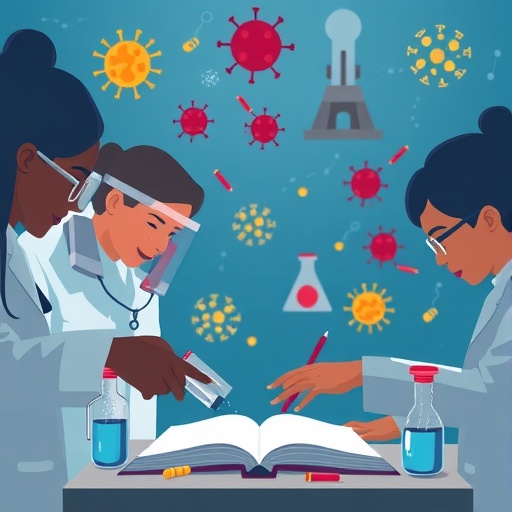The COVID-19 pandemic unveiled deep-rooted fissures in educational systems across the globe, rendering visible the disparities that have long persisted beneath the surface. The recent study by Kastorff and Heine sheds critical light on this issue, particularly focusing on how socioeconomic status affects scientific literacy among students. Drawing insights from the Programme for International Student Assessment (PISA) conducted in 2018 and 2022, the research reveals alarming trends indicating an expansion of educational inequalities during these tumultuous times.
As the world faced lockdowns and a swift move to online education, it became increasingly apparent that not all students had equal access to the resources necessary for effective learning. Students from higher socioeconomic backgrounds generally had better access to technology, stable internet connectivity, and dedicated learning environments. In contrast, those in lower-income households struggled with inadequate resources, which further exacerbated existing inequalities. The results of the PISA assessments during this period pinpoint a stark contrast in scientific literacy levels, illustrating how systemic inequities can profoundly impact educational outcomes.
Scientific literacy, a fundamental skill set in today’s knowledge-driven society, encompasses not only the ability to understand scientific concepts but also the application of this understanding to real-world problems. The persistent gap in scientific literacy levels between socioeconomic strata post-COVID highlights a critical area of concern. In the PISA surveys conducted before and after the pandemic, the data demonstrates a significant shift in performance; students from disadvantaged backgrounds showed a marked decline in scientific understanding and aptitude compared to their higher-income peers.
Moreover, the pandemic-induced transition to remote learning introduced challenges to pedagogical approaches that could not be adequately addressed within the existing educational frameworks. Many educators were unprepared for the sudden shift, resulting in a reliance on untested methods that failed to account for the diverse needs of students. This inadequacy was particularly pronounced among students from lower socioeconomic groups, who not only faced practical challenges but also psychological and emotional barriers that hindered their learning potential.
The implications of these findings are profound and multifaceted. A decline in scientific literacy among economically disadvantaged students not only limits their academic and professional prospects but also perpetuates a cycle of inequality. As the world becomes increasingly reliant on scientific knowledge to navigate complex global challenges, from climate change to public health, the need to address these disparities becomes essential. A society that neglects to provide equal opportunities for all its students risks not only its moral compass but also its future innovation and progress.
The insights from the PISA data challenge policymakers and educators to rethink and reshape educational strategies and interventions. To combat the widening gap, comprehensive support systems must be developed that specifically target the needs of underprivileged students. This may include implementing programs that offer additional educational resources, tutoring, and access to technology. Furthermore, training for educators to improve their digital teaching skills can significantly enhance learning outcomes for disadvantaged groups.
The role of families and communities in supporting student learning has also been underscored. Engaging parents and guardians, especially those from lower socioeconomic backgrounds, can facilitate a more supportive learning environment that reinforces the importance of education. Building community partnerships can also provide necessary resources and mentorship opportunities that empower students to succeed academically.
Addressing educational inequalities requires a collective effort that encompasses all stakeholders in the education sector. Governments, educational institutions, non-profits, and private sectors must collaborate to implement effective policies that ensure that every child, regardless of their background, can achieve a high level of scientific literacy. The objective should be not only to recover from the setbacks experienced during the pandemic but to build a more resilient and equitable educational landscape for future generations.
As we navigate the post-pandemic recovery phase, it is essential to learn from the lessons of the past few years. A focus solely on recovery without addressing the underlying systems of inequality will only result in the same issues replicating themselves. Educators and policymakers must take a proactive stance in identifying barriers to educational equity and working collaboratively to dismantle them.
In conclusion, the findings from Kastorff and Heine’s study serve as a call to action. The educational inequalities exacerbated by the COVID-19 pandemic should catalyze a reevaluation of how we approach education in a post-pandemic world. Investing in the future means ensuring that all students, no matter their socioeconomic status, have access to quality education and the opportunity to thrive in an increasingly complex and scientific world.
As we look ahead, the commitment to educational equity must become a national priority. It is not merely an educational issue; it is a matter of social justice, economic sustainability, and cultural advancement. With targeted interventions, innovation in educational delivery, and a keen focus on inclusivity, the educational disparities highlighted by the pandemic can be overcome, paving the way for a more equitable future.
While the road to recovery and reform is surely challenging, it is also filled with opportunities for growth, development, and unity. The need to empower every student with scientific literacy is fundamental—not just for individual success but for the collective advancement of society as a whole.
Subject of Research: Socioeconomic status and scientific literacy in the context of educational inequalities during the COVID-19 pandemic.
Article Title: Socioeconomic status and scientific literacy: expanding educational inequalities during the COVID-19 pandemic—insights from PISA 2018 and 2022.
Article References:
Kastorff, T., Heine, J. Socioeconomic status and scientific literacy: expanding educational inequalities during the COVID-19 pandemic—insights from PISA 2018 and 2022.
Large-scale Assess Educ 13, 36 (2025). https://doi.org/10.1186/s40536-025-00273-8
Image Credits: AI Generated
DOI: https://doi.org/10.1186/s40536-025-00273-8
Keywords: Educational inequality, socioeconomic status, scientific literacy, COVID-19, PISA.




